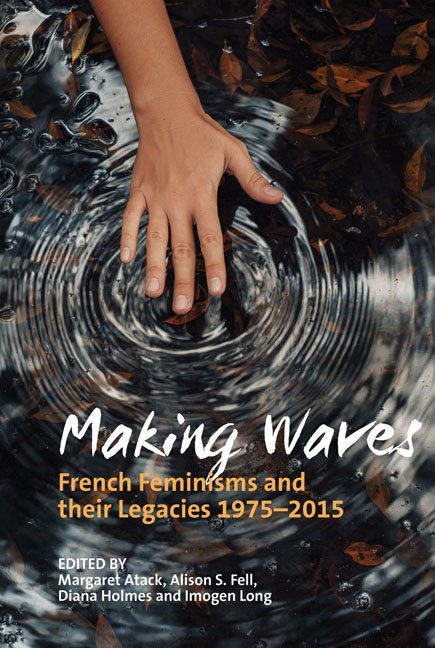Book contents
Introduction: Making Waves
Summary
In the late 1980s and 1990s it was commonplace to announce the death of feminism as a social movement. A 1989 special journal issue in France was entitled: ‘Le féminisme … ringard?’ (‘Is feminism … passé?) (BIEF, 1989). In the UK Vicki Coppock, Deena Haydon and Ingrid Richter argued in 1995 that: ‘Post-feminism happened without warning. It seemed to arrive from nowhere. One minute there were feminisms, identified by their diverse political standpoints, and their contrasting campaign strategies, the next … it was all over’ (Coppock et al., 1995, 3). Thirty years later such pronouncements seem premature. The past few years have seen a resurgence of feminist debate and protest that echoes that of earlier decades. It is a particularly apt moment, then, to examine past and current feminist activists who have been ‘making waves’ in French society.
The waves metaphor remains, moreover, the dominant conceptual framework with which to talk about the development of feminist thought in the nineteenth and twentieth centuries. Neeru Tandon's summary of the waves of international feminist movements echoes many similar overviews:
Feminism, as a whole, came in three waves, each dealing with different aspects of the same issue; the first wave being the feminism movement in the nineteenth to early twentieth centuries, which dealt mainly with the Suffrage movement; the second wave (1960s–1980s) with the inequalities of laws, as well as unofficial inequalities. The third wave of feminism (1990s–current) arose from the perceived failures of the second wave. (Tandon, 2008, 1)
In the histories of feminism published in the last 30 years or so, ‘first wave’, ‘second wave’ and (with less consensus) ‘third wave’ are the principal terms used to describe discrete periods of the development of feminism in France as well as in the US and UK. Historian Christine Bard, for example, recently published two volumes focusing on nineteenthand twentieth-century French feminism entitled Les Feministes de la premiere vague (First wave feminists) (2016) and Les Feministes de la deuxieme vague (Second wave feminists) (2012).
Using the wave metaphor to trace the history of the women's movement in this way can suggest that any developments or shifts occur only in dramatic and revolutionary upsurges of activism, sweeping away all that came before them. This sense of revolution, of starting afresh, was certainly present in 1970s French feminist writings and activism, which are the focus of this volume of essays.
- Type
- Chapter
- Information
- Making WavesFrench Feminisms and their Legacies 1975–</I>2015, pp. 1 - 16Publisher: Liverpool University PressPrint publication year: 2019



